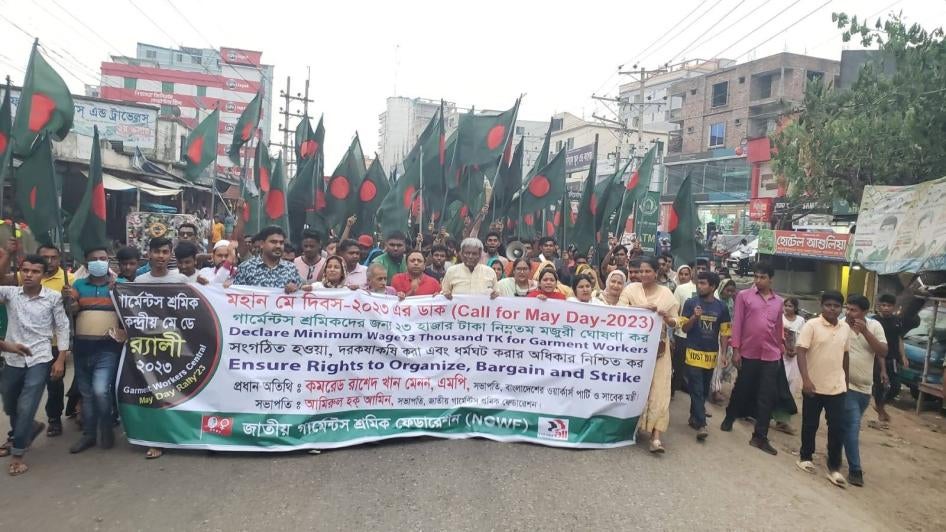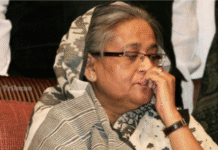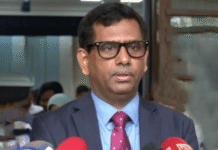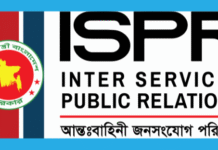
For Immediate Release
Bangladesh: Social Audits Shortchange Workers
Shahidul Islam’s Killing Underscores Heightened Risks for Independent Unions
- The social audits and certifications that brands and retailers use are totally inadequate to protect workers, especially from threats to workers trying to organize independent unions.
- Human Rights Watch research has shown that standard social audits present greater risks for labor abuses being under-detected or undetected, including for freedom of association.
- Brands and retailers globally should revamp how they monitor workers’ rights to freedom of association in their value chains.
(London, September 14, 2023) – The social audits and certifications that brands and retailers use are totally inadequate to monitor and respond to threats to workers trying to organize independent unions, Human Rights Watch said today in releasing an analysis of standard social audit reports of garment factories in Bangladesh.
Most audit reports either barely addressed the issue of freedom of association, or in some cases, recycled stock language as part of auditor findings on freedom of association from other factories’ audit reports. Previous Human Rights Watch research has shown that standard social audits present greater risks for labor abuses being under detected or undetected, especially for issues like discrimination and harassment, forced labor, child labor, and freedom of association.
The seriousness of these shortcomings assumes more importance in the aftermath of the June 2023 killing of Shahidul Islam in Bangladesh. Islam, an independent labor union leader, was killed as he was leaving a factory operated by Prince Jacquard Sweater Ltd. after trying to mediate on behalf of garment workers over nonpayment of wages and Eid bonus. The factory had undergone audits under two commonly used social audit systems.
“Islam’s killing is a chilling reminder of the dangers facing independent labor union leaders,” said Aruna Kashyap, associate corporate accountability director at Human Rights Watch. “Brands and suppliers should not rely on social audits and certifications as they are woefully inadequate, particularly in preventing violence and harassment of workers seeking to form or join independent labor unions.”
Human Rights Watch released an analysis of 40 social audit reports of garment factories in Bangladesh provided by a European clothing brand in 2018. Brands and retailers globally should revamp how they monitor workers’ rights to freedom of association in factories from which they source.
Following the Islam killing, the authorities have registered a criminal complaint and are investigating the case. They have made a number of arrests. People interviewed by Human Rights Watch said that a few “goons” involved with the so-called yellow unions operating in the areas where the attack occurred were among those arrested. One experienced activist said that a few of the names had come up on other occasions since December 2020, when workers had reported intimidation and harassment. Bangladesh authorities should ensure that an independent and thorough investigation is conducted to hold accountable all those involved in directing, planning, and executing the attack, Human Rights Watch said.
“Yellow unions” are set up or controlled by employers and violate workers’ right to freedom of association under international labor rights law. They have been used to thwart workers’ efforts to organize independent unions, an increasing problem in Bangladesh.
The failure of the Bangladesh authorities and garment manufacturers to curb abuses in the rights of independent labor unions to operate, connected to the growth of “yellow unions,” has contributed to the violence and harassment of independent labor unions and workers, Human Rights Watch said.
Brands typically rely upon standard social audit or certification programs. These are private inspections of work sites usually conducted by audit firms to assess compliance with their codes of conduct, including labor standards. Such inspections are conducted over a few days and typically paid for by brands or suppliers, with workers interviewed inside factory premises, which is not a safe space for workers to speak candidly about their working conditions. These audit reports are not published.
Prince Jacquard Sweater Ltd. had undergone social audits by two well-known third-party social audit programs, amfori and Sedex. In June, Human Rights Watch wrote to amfori and Sedex. Both confirmed that the factory had in the past been audited using their programs. A Sedex representative said they could not share a summary of the audit findings owing to the confidentiality of “specific details” of audits; amfori also cited confidentiality but provided a brief summary stating that the audits had detected some wage-related problems. Prince Jacquard Sweated Ltd. did not respond to Human Rights Watch.
Sedex and amfori should publish the social audit reports of Prince Jacquard Sweater Ltd. and commit to revising their policies to publish all social audit reports in a searchable database, Human Rights Watch said.
More broadly, all social audit and certification programs should require the publication of their audit reports. Transparency is critical to learn more about what these reports say, and the confidence levels audit firms or audit programs have in the information they generate. A Human Rights Watch review of unpublished Sedex Members’ Ethical Trading Audit (SMETA) reports, including from 2022, for example, found that Sedex audit reports carry a standard disclaimer that a Sedex audit “does not confirm … compliance with any legal regulations or industry standards.” In its letter to Human Rights Watch, Sedex did not commit to making this disclaimer public on its website and other marketing materials.
As mandatory human rights due diligence laws are being developed around the world, policymakers should acknowledge the limitations of third-party auditing and certification programs. They should hold auditing firms and auditing programs accountable as service providers for the quality and credibility of the social auditing services they offer along with holding brands accountable for their risk-based due diligence tools.
Governments need to closely scrutinize the social auditing industry and, at a minimum, require brands to publish all social audit reports when they opt to use such audits or certifications as part of their human rights and environmental due diligence.
Laws requiring brands and retailers to conduct human rights and environmental due diligence should not permit social audits and certifications alone to be sufficient evidence of due diligence. Organizations like amfori, Sedex, and others have repeatedly acknowledged that their social audit tools are not substitutes for regulatory oversight.
Relying on social audits or certifications is not the proper way to address issues around freedom of association and collective bargaining. Instead, brands should support the creation of a monitoring and grievance redress system in consultation with independent labor unions and labor rights organizations operating in Bangladesh. Such a mechanism should be aligned with the effectiveness criteria outlined in the UN Guiding Principles on Business and Human Rights, and at a minimum, ensure independent labor unions equal power as businesses in the governance of such a monitoring and grievance mechanism.
Brands that are part of the International Accord for Health and Safety in the Textile and Garment Industry, which is being renewed, should ensure that the Accord’s protections for workers’ freedom of association and collective bargaining are expanded. Brands that have yet to join the Accord should do so.
Brands should also review and adopt fair purchasing practices, including fair prices and responsible contracts to prevent and mitigate the risk of causing or contributing to labor abuses, including through unauthorized subcontracting.
“Brands, audit firms, and audit and certification schemes tout audits and certifications as independent and credible,” Kashyap said. “But where they are flawed or opaque in ways that put in doubt their independence and the credibility of information they generate, they cannot be used as tools for human rights due diligence.”
For additional detail about the analysis of the audits, Bangladesh restrictions on unions, and other detailed findings, please see below.
For more Human Rights Watch reporting on corporate accountability, please visit:
https://www.hrw.org/topic/
For more information, please contact:
In London, Aruna Kashyap (English): + 1-917-385-3808 (mobile); or kashyaa@hrw.org. Twitter: @ajkashy
In Washington, DC, Jim Wormington (English, French): + 1-917-592 8738 (mobile); or worminj@hrw.org. Twitter: @jwormington
Freedom of Association and “Yellow Unions” in Bangladesh
Bangladesh has a longstanding pattern of violations of the rights of freedom of association and collective bargaining. The police cracked down on independent unions following wildcat protests by workers demanding wage increases in 2016 and 2019. The International Labour Organization (ILO) Committee of Experts on the Application of Conventions and Recommendations noted in its 2022 report a series of legal and other practical barriers, and union-busting tactics used by employers, that thwarted workers’ ability to join and form unions of their choosing.
Further, Bangladesh law does not allow the formation of unions in factories located inside export processing zones, and workers are only permitted to form worker welfare associations, which have fewer legal protections than the already low protections for unions. Reforms are needed to give unions protections in line with the ILO recommendations.
“Yellow unions” are set up or controlled by employers and violate workers’ right to freedom of association under international labor rights law. The International Labour Organization’s Convention on Right to Organise and Collective Bargaining (Convention No. 98) states in article 2(2) that “acts which are designed to promote the establishment of workers’ organisations under the domination of employers or employers’ organisations, or to support workers’ organisations by financial or other means, with the object of placing such organisations under the control of employers or employers’ organisations, shall be deemed to constitute acts of interference within the meaning of this Article.”
The ILO Committee on Freedom of Association has ruled that “the intervention by an employer to promote the establishment of a parallel trade union constitutes an act of interference by the employer in the functioning of a workers association, which is prohibited under Article 2 of Convention No. 98.” Workers have the right to form or join unions of their choosing that genuinely represent workers’ rights and interests.
A 2020 US Senate Foreign Relations Committee report on Bangladesh noted concerns about growing yellow unionism in Bangladesh, and that the practice “has resulted in authorities rejecting the registration application of independent union leaders because another union already exists – the ‘’yellow’’ one.”
The Solidarity Center, an international worker rights organization, told Human Rights Watch that according to union registration data it analyzed, garment factory-level unions affiliated with six independent union federations had an average union registration success rate of about 43 percent from 2020 through 2022, compared with what the Bangladesh government states is the overall average union registration success rate of about 88 percent.
The Islam Case
Islam was the Gazipur president of the Bangladesh Garment and Industrial Workers Federation (BGIWF), an independent union federation. A criminal complaint registered by the police said that he and other representatives met with officials from Prince Jacquard Sweater Ltd. to try to resolve workers’ complaints regarding unpaid wages for the months of May and June and an Eid bonus. As the representatives were leaving and reached the front of the factory, a gang approached and threatened them for helping workers, and attacked them. The attackers beat Islam unconscious and he was declared dead in a hospital.
The criminal investigation has yet to be completed and based on Human Rights Watch interviews, the police have yet to determine who was behind this gang’s violence. The factory management has denied links to the attack and says it paid all of the previously unpaid wages following Islam’s death. Human Rights Watch wrote to the factory seeking additional information about clearing unpaid wages and the bonus, and Prince Jacquard Sweater Ltd. has yet to respond.
The Bangladesh Garment Manufacturers and Exporters Association (BGMEA) has sought to cast the attack on Islam as one between trade unionists without drawing a distinction between independent unions and “yellow unions,” which is deeply problematic. The BGMEA has yet to take effective measures to prevent management and its member factories from interfering with workers’ efforts to form independent unions and curb the growth of “yellow unions” among its member factories.
The social audit programs operated by amfori and Sedex are among two of the most widely used programs worldwide and not just limited to apparel. Sedex operates SMETA, while amfori operates the Business Social Compliance Initiative (BSCI). These are standard social audit programs that use codes of conduct covering a wide range of labor rights issues, including workers’ freedom of association and wages.
Sedex and amfori’s social audit programs are opaque and neither organization publishes their social audit reports. They also do not publish a list of names or street addresses of the sites they audit or the date of the last audit, making it nearly impossible for labor rights organizations and unions to find out which sites are even audited using their program.
In email responses to Human Rights Watch questions, Sedex stated that Prince Jacquard Sweater Ltd. had been audited once under its systems in 2021 but declined to specify the month or to summarize key audit findings and corrective actions. The factory itself was not a Sedex member and Sedex stated that “it had no visibility” over whether a Sedex member brand was sourcing from the factory.
An amfori representative stated that a factory was audited under its program in November 2021 and December 2022, and further stated that the reports found “multiple violations,” including “delayed payment of wages, a failure to ensure annual wage increments as stipulated by law, gaps in benefit payments, and irregular deductions in payments.” The representative said they did not know the corrective actions that were taken and were finding out from amfori’s members. Human Rights Watch wrote to Prince Jacquard Sweater Ltd., requesting a copy of the audit reports and corrective actions. The factory did not respond.
(Email correspondence with Sedex and amfori on social audits pertaining to Prince Jacquard Sweater Ltd. on file with Human Rights Watch).
Human Rights Watch Analysis of Social Audit Reports
More broadly, and unrelated to Prince Jacquard Sweater Ltd., in 2018, a European brand provided 50 standard social audit reports to Human Rights Watch to enable the organization’s research and analysis, as social audits reports are typically not public. Forty of those 50 reports were from Bangladesh. The reports were provided on the condition that Human Rights Watch would not identify the company that provided them.
These were standard social audits conducted over a day or two, which Human Rights Watch understands is typical. Such audits are different from in-depth investigations. The factories were notified of the window within which audits would occur; that is, they are semi-announced, and auditors said they interviewed workers on site. The audits were conducted by six global audit firms, most in 2017 and 2018. The audit methods and reporting format continue to be used without significant changes.
In Bangladesh, 26 of the 40 audits were “full audits,” in which auditors had assessed all aspects of the Code of Conduct, including workers’ freedom of association, and 14 were “follow-up audits.”
In each audit, the auditors were expected to assess whether the factory respects workers’ rights to “form unions in a free and democratic way” and bargain collectively; “does not discriminate against workers because of their trade union membership” and “does not prevent workers’ representatives from accessing or interacting with workers in the workplace.”
Since the audits did not reveal the factory names, Human Rights Watch could not determine whether these 40 factories had in fact engaged in any anti-union practices around the time of the audits and compare them with audit findings.
But a reading of the audit reports based on what the auditors were expected to assess raises several concerns about how auditors evaluated risks to freedom of association. Six out of the 26 full audits found “none” or “no findings” when expected to outline what they found. In another report, the freedom of association section was blank. In 10 of the 14 follow-up audits, auditors had skipped assessments of workers’ freedom of association stating that no previous findings existed; noted they had no finding; or left the section blank.
Human Rights Watch analysis of two reports that noted the presence of a union raised additional concerns. In one factory, auditors from Audit Firm-4 had noted that there were more than 1,800 male and 2,100 female permanent workers, all unionized. In the other, auditors from Audit Firm-2 had noted that the factory had over 2,300 male and over 3,000 female workers, all unionized. However, neither factory had a collective bargaining agreement, which would be expected with a fully unionized workforce.
Audit Firm-2 had wrongly claimed that workers were “free to join or form the trade union” in a factory housed in an export processing zone where the law does not allow workers to form unions, and instead only allows the formation of worker welfare associations:
The overall observation shows that the audittee fulfills [sic] the requirements of this performance area. No trade union has been formed by the workers of the factory. Workers are free to join or form the trade union. No restriction has been imposed to [sic] the workers from the management. The facility has formed workers welfare association (WWA) through election process. Meeting of WWA was held on regular basis. No evidence was identified and reported that workers representatives are discriminated.
Human Rights Watch also found that a number of audit reports of different factories had identical or very similar language when describing audit findings related to freedom of association.
The use of such stock phrases across different factories is only possible to detect when numerous audit reports issued by the same audit firm are accessible. Regulators and courts should be aware that the quality of such social audit reports may not be fully assessed by looking at one report in isolation; rather other audit reports issued by the same audit firm in the same country should be analyzed to determine whether the audit firm uses stock phrases.
Where such stock phrases are being used, the auditing firm should explain the facts and circumstances in which they use stock phrases, along with additional factory-specific information and the underlying context. One experienced auditor Human Rights Watch interviewed explained that stock language when describing recommendations or corrective actions is different from using stock language while describing audit findings. The latter raised the “hazard of cutting and pasting”:
You lose context and you lose the human side of it. One of the gaps in traditional auditing is that it can be less worker focused and that means there’s less time and effort spent on discussions and interviews with workers. It takes more time and effort to put together a report that is really reflecting that worker’s input. Workers’ experiences are going to be different. The over-standardization of reporting language will often diminish the unique situation faced by the workers in a particular workplace or context.
He also said that a few years ago he had come across “pre-populated” audit reports generated by third-party audit programs. He recalled one egregious example that was part of an “attempt to simplify the reporting process and make the audit cheaper so it would take less time to fill out the report because you were just filling in the blanks rather than writing it up.” He said his audit firm did not use such “pre-populated” reports.
The information below provides an example of the extracted text that is specifically on freedom of association and collective bargaining from reports issued by Audit Firm-4. Three of the six audits contain 100 percent identical text for this section.
- Social audit report 1: “The facility has developed freedom of association policy. Although no trade union is formed in the facility and currently there is no required to formed trade union in side of the BEZPA but they have open policy to formed WWA as parallel means. Regular meetings are held between the workers representative and the management. Workers representatives’ has full access to the workers in the workplace.”
- Social audit report 5: “Facility has policy and procedure of Freedom of Association and communicated this policy with the workers. Management respects workers’ rights to bargain collectively. Facility has formed trade union and Participation Committee (PC). Regular meetings are held between the workers representative and the management. Workers representatives’ has full access to the workers in the workplace.”
- Social audit report 12: “Facility has policy and procedure of Freedom of Association and communicated this policy with the workers. Management respects workers’ rights to bargain collectively. Facility has no trade union but formed Participation Committee (PC) as parallel means. Regular meetings are held between the workers representative and the management. Workers representatives has full access to the workers in the workplace.”
- Social audit report 15: “Facility has policy and procedure of Freedom of Association and communicated this policy with the workers. Management respects workers’ rights to bargain collectively. Facility has no trade union but formed Participation Committee (PC) as parallel means. Regular meetings are held between the workers representative and the management. Workers representatives has full access to the workers in the workplace.”
- Social audit report 22: “Facility has policy and procedure of Freedom of Association and communicated this policy with the workers. Management respects workers’ rights to bargain collectively. Facility has no trade union but formed Participation Committee (PC) as parallel means. Regular meetings are held between the workers representative and the management. Workers representatives’ has full access to the workers in the workplace.”
- Social audit report 25: “Based on satisfactory evidence it was noted that the main auditee entirely respects this principle /performance area. Note: Based on workers interview it is demonstrated that workers are not restrained to establish trade union though they didn’t form trade union yet. However, as per documentary evidence, workers’ interview, workers representatives’ interview and site observation it is evident that auditee has full respect to form trade union and bargain collectively.”









